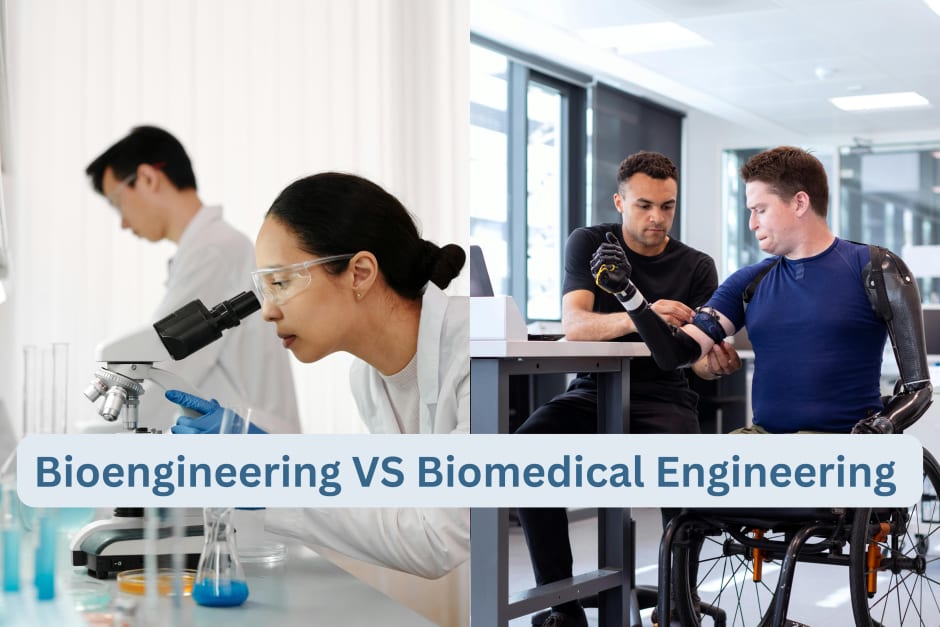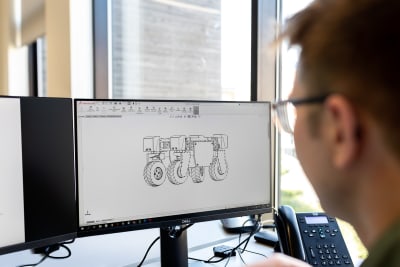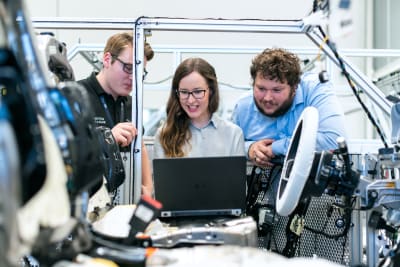To the layman and even a few experienced engineers, biomedical engineering and bioengineering seem similar. Their names are similar, and their areas of expertise overlap greatly. However, biomedical engineering and bioengineering are wildly different professions.
On this page, we’ll compare biomedical engineering and bioengineering, hopefully helping you understand the difference between the two. We’ll also cover both and the various educational opportunities available for both.
Remember that this will only tell you about some of the two professions. They are vast professions, each covering a lot of ground. Think of this as more of an overview of what each profession offers. This information should make it easier for a person to determine which position would be the best for them in the future if they are planning on studying.
What is Bioengineering?
Bioengineering deals primarily with how the biological system works. This means that a bioengineer may
- Look at building artificial tissues.
- Create pharmaceutical products
- Gene therapy and gene editing.
- Develop vaccines.
Nowadays, a lot of the work carried out by bioengineers will look into creating tissue that can be implanted into humans. So, if you hear news articles about organs created in labs or new vaccines being developed, then a bioengineer was behind all that.
Bioengineers can also work beyond the medical establishment. Their skills are required in agriculture, fuels, and even weapon systems. This means that the work as a bioengineer will be much more varied. Generally speaking, if a job involves an understanding of biology, then a bioengineer will be somewhere working there.
What is Biomedical Engineering?
A biomedical engineer creates artificial devices to work in humans and animals. This includes:
- Pacemakers
- Insulin pumps
- Artificial organs (machine organs)
- Ventilators
This form of engineering is much closer to the more ‘traditional’ form since it involves the creation of machinery to help solve a problem. Yes, there will be a lot of overlap with bioengineering, but bioengineering would be closer to what a medical expert does. At the same time, a biomedical engineer would be closer to what an engineer does. You’ll see more about this later.
A Biomedical engineer will likely spend their entire time working in medical establishments. Their skills are rarely required outside of that. At the very most, a biomedical engineer will be able to transition from working on humans to animals, but the opportunities will be much more limited.
Educational Requirements
Biomedical engineering and bioengineering will require bachelor’s degrees, at the minimum. However, most top institutions for both professions are unlikely to award people positions unless they’ve studied at a far higher level than this. At a minimum, a person would likely need a master’s degree, but a Doctorate would be even better for those who want the best positions. Of course, the Doctorate can come much later once somebody has broken into the field.
A bioengineer will need to cover the following at the college level:
- Biology
- Chemistry
- Physics
- Math
- Various engineering principles.
The course will focus on how the body works while a person learns to become a bioengineer. This means a person would need to have a solid understanding of biology. This includes biomechanics (how the body works), medical imaging, and more. There’ll be engineering coverage, but only the engineering related to the biological system.
Biomedical engineering covers some of the same ground. After all, a person must understand how the body works to create machines that benefit the system. However, there’ll be a greater focus on the engineering side of things. Biomedical engineers will learn much more about operating in a clinical setting, project management, and the fundamentals of medical devices and their regulations.
Of course, when somebody opts to study beyond the bachelor’s level, they’ll specialize a bit more, and the course material will become very specific. This would be years and years down the line, though.
At High School, you should focus on biology, math, and physics. All three are educational requirements for any bioengineering or biomedical engineering course.
The Core Skills
The ‘core’ skills for both professions are similar – a knowledge of math, science, and engineering concepts. Although, the blend will vary depending on the profession. For example, a bioengineer would likely need more knowledge of biological tissues than a biomedical engineer would need.
Beyond this, a bioengineer would need to understand more about genetic engineering, have solid problem-solving skills, understand pharmaceutical products, etc. Engineering would have a very biology-focused slant.
On the other hand, a biomedical engineer would require more knowledge about how medical devices work in the biological system. For example, how pacemakers work, etc. They must also have strong analytical skills that will allow them to improve these devices or ensure they stay working correctly. They’ll also need to have a good understanding of various pieces of software and, since most of their work is likely to happen in a clinical environment, have a better idea of how to communicate with people. Many biomedical engineers will also be leading projects, so project management skills are very much sought after.
Both professions are ever-evolving, so those who enter them must be committed to further research and growth. Those who aren’t will not thrive.
Job Opportunities
There are huge job opportunities available for both professions.
A bioengineer, for instance, may spend time on:
- Developing technology for use in the farming industry. After all, creating more productive crops is important (and relies heavily on biological engineering).
- Creating biological organs in a lab environment (not mechanical, biological)
- Research into gene editing.
- Developing new pharmaceutical products.
- Creating new diagnostic methods.
- Work in the fuel sector, particularly with biofuel and renewable energy.
A biomedical engineer will be focused purely on medical work (while a bioengineer can tackle multiple areas). This includes the creation of medical devices, diagnostic tools, and software for diagnosis.
You’ll find bioengineers working in all sorts of environments, depending on what they have opted to focus on. A bioengineer can be found on farms, labs, medical establishments, working with the government, and in various research capacities.
Biomedical engineers, however, will be found in medical establishments. This includes clinics, hospitals, and research facilities. You may also find them in industries focusing purely on creating medical tech.
So, as a bioengineer, you have many professions to choose from. You can get into many industries, from energy to agriculture to medicine. Meanwhile, if you’re a biomedical engineer, you’ll be focused purely on medical establishments for the rest of your life.
No matter which profession you get into, chances are that most job opportunities will be available in the same areas - major towns and cities. The one exception is bioengineering in agriculture, where you’ll likely be in more rural areas.
Salary Expectations
Thankfully, regardless of your profession, the job prospects are good. Both biomedical engineering and bioengineering are growth industries. They are growing at a faster rate than the average. However, remember you must move to certain areas for maximum job opportunities. You’ll also find it a lot easier to get a position if you have studied beyond the bachelor’s level.
The salaries for biomedical engineering and bioengineering are very close, at least at an entry-level. There’s only a couple of hundred dollars in it. The biomedical engineer can earn around $89,500 annually, and a bioengineer $89,000 yearly. However, at the top end of the profession, a bioengineer can earn $30-$40,000 more than biomedical engineers.
Biomedical Engineering vs Bioengineering – A Summary
Biomedicals and bioengineers are very similar as they require a solid understanding of biology and engineering principles. However, the similarities end there.
A biomedical engineer will be much more focused on creating machines, diagnostic equipment, etc., that can be used in a medical environment. At some point, a biomedical engineer will have designed all diagnostic equipment, artificial limbs, pacemakers, etc.
A bioengineer’s work is much more varied. They engineer biological materials. While most bioengineers will work in medical establishments (the creation of pharmaceutical products, replacement organs, etc.), some can transition into working with other biological products, including energy and agriculture.
If you’re planning to get into biomedical engineering or bioengineering, you must establish which profession would be best at an early stage. This is because you will need to specialize at a college level as the skillset, while there is some overlap, eventually becomes quite varied. Thankfully, the job prospects for both are quite high, so it is a matter of what will interest you the most when you’re looking for a profession.





